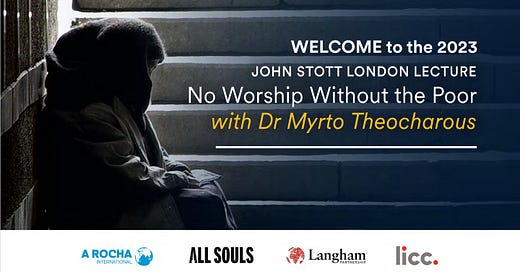Myrto Theocharous on no worship without the poor; introducing Jesus in John; and leveraging Parkinson's law
Welcome to my newsletter, ‘Bible, Mission, and More’, where I share what’s on my mind as I teach, research, and write on the Bible and mission, children-at-risk in the Bible and contemporary society, Psalms and Wisdom Literature, and a range of other topics. I teach at All Nations Christian College in the UK, though views are my own. You may also like to check out my Bible and Mission website.
Each Tuesday I’ll share something I’ve read, something I’ve written or recorded, something on learning and teaching, and a quote to reflect on.
Something read – Myrto Theocharous on No Worship Without the Poor
A while ago I wrote about Myrto Theocharous’ article on Ezekiel, wealth, and dehumanisation. I want to return to her work today by highlighting an extraordinary public lecture she gave a year ago at the annual John Stott lecture in London.
Titled, No Worship without the Poor, Theocharous brilliantly examines Deuteronomy and the role the poor and other marginalised groups (the widow, orphan, and alien) play in the book. Back in 2005 I wrote my MA dissertation on the widow, orphan, and alien in Deuteronomy so it is a topic I’ve been interested in for a long time. I wish I’d seen this lecture then!
Some of her insights relate to contrasts between the propaganda claims of Ancient Near Eastern kings to care for the poor and the concrete embedding of Israelite concern in its laws. She also notes the democratising of these claims in the OT; i.e., it’s not just the king’s responsibility to care for the vulnerable; it is everyone’s.
Theocharous discusses the holy status of the tithe offerings set aside for the poor and, as part of their worship, the declaration of an Israelite that they have cared for the widow, orphan, and alien. The suggestion is that unless an Israelite can say this, their worship and prayer is not qualified.
There is much more in there and I’d urge you to watch it. The lecture itself is just under and hour and is followed by a Q&A with Chris Wright asking the questions. You can also find the PPT slides and details of other annual lectures here: John Stott lectures.
Something written – Introducing people to Jesus: Sermon on John 1
A while ago our church worked through a sermon series on the Gospel of John (I posted previously on my sermon on John 11 in that series: How do we speak about life in the midst of death?) We took our time, interspersing a few weeks on John with other theme and book series. One of the great things about taking our time to go through the book was that we got to spend time in passages that might be missed or only glanced at in a shorter series.
Early on I preached on the later part of John 1 which focuses on Jesus meeting some of his disciples. I was particularly pleased to speak on this passage because it connects with my family story in a rather wonderful way. Back in the mid-1950s my great aunt was inspired by a sermon on John 1 and Andrew, the introducer. You can watch the sermon to find out how: Sermon on John 1:35-51
Learning and teaching – Leveraging Parkinson’s law
Parkinson’s law dates back to a 1955 article in The Economist by Cyril Northcote Parkinson. Parkinson studied work practices in the British Civil Service and noticed that "work expands so as to fill the time available for its completion."
Think about your last essay: how far in advance were you assigned it and what did the spread of your work on it look like in practice? Let’s say you were given four weeks to hand it in. Chances are you did most of the really focused work in weeks three and four. If your deadline had only ever been two weeks, would you have put in fewer hours as a result? Parkinson’s law says probably not.
If you’ve ever found yourself working late to finish up a load of tasks before going on holiday you might recognise this as well. Sometimes you have too much to do, but it may be that your focused work on completing a task only kicks in when it is urgent. But what if we chose to do that focused work earlier in the process?
This useful video Parkinson’s law: How to manage your time more effectively outlines a few ways students can leverage Parkinson’s law including: creating artificial deadlines, breaking down big tasks (with deadlines for each smaller chunk); and creating a challenge. You may also like this short article.
Quote – Myrto Theocharous on taking care of God’s household
Referring to Deut. 16:11, 14 Myrto Theocharous concludes her lecture (see above), imagining God saying to the worshipper:
‘I take care of your household; please take care of mine. And there you will find joy. Trust me, there you will find joy.’
Thanks for joining the journey and see you next week,
Tim





Thanks Federico; I agree about quiet stories!
Thank you for this treasure trove of materials! I'm particularly interested in the Theocharous talk (marked it as "Watch later" on YouTube), but for now I'd like to say the "introducer" sermon told quite a story (I love to hear those "quiet evangelization" stories… and I think Jesus is very fond of them too).